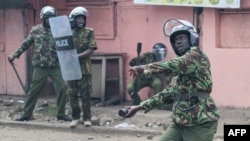NAIROBI - Protesters were out in the streets in Kenya again Thursday demonstrating against the high cost of living and recent tax hikes. This comes after opposition leader Raila Odinga called for a three-day demonstration that started Wednesday.
Protesters showed up for a second day in a row in some parts of Nairobi and elsewhere in the country, demonstrating against what they say is a cost of living that’s been drastically going up each and every day.
The three-day demonstrations that started Wednesday, led by opposition leader Raila Odinga, have seen 300 people reportedly arrested, including several senior opposition leaders.
Some were in court Thursday to respond to accusations of looting, assaulting police and destroying property.
David Omwoyo, head of Kenya’s Media Council, said one police officer masqueraded as a reporter to arrest a protester.
"What we saw was a policeman in civilian clothing who was amongst the press corps during the demonstrations at one of the suburbs in Nairobi," he said. "And then suddenly he put his camera or phone in his pocket and jumped across, grabbed one of the protesters and another police officer immediately joined him. I think it was a setup. Then, they put the protester into their police vehicle."
Omwoyo told VOA the incident is the first of its kind and it’s scary for members of the media. If protesters or the public believe police are impersonating journalists, he said, it could be dangerous for members of the media as clashes between police and protesters continue.
Kenyan President William Ruto, addressing residents of Isiolo County on Thursday, urged residents to maintain peace, saying that destruction of property during the demonstrations will affect development of the country.
"Every part of Kenya has said we cannot sabotage our economy, using violence and destruction of business, destruction of property," he said. "Kenya is the only place we have to call home, and we must protect it by all means."
On Thursday, veteran opposition leader Odinga wrote on Twitter, "the voice of the people must be heard," and insisted the peaceful protests continue.
Vincent Kimosop, an economic policy and governance expert based in Nairobi, said it’s important to analyze the impact of recent events.
"If you look at the impact of the disruptions that were brought by the war in Ukraine . . . the disruption of the global supply chain with COVID-19, and for close to two years, we shut the engines of economic production while at the same time pushing into subsidies, allowing people to access money," he said. That means "the monies that have been pushed to facilitate people through sad situations. Of course, when you shut down economic engines, what happens, you are basically preparing for inflation."
The protests are expected to continue Friday.




